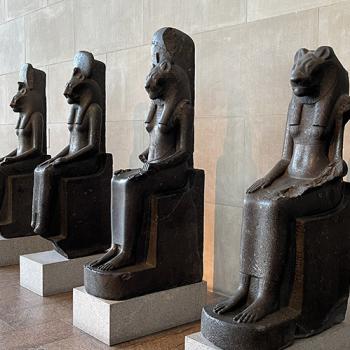
Jessica Powers is my new favorite Catholic poet. Her work is quite simply brilliant. A Carmelite nun and lifelong Wisconsinite, right at the beginning of her Selected Poems (1999), we find a beautiful piece entitled “The Mercy of God.” We could wish for no finer as an introduction to Powers’ unassuming yet elegant writing. Those who enjoy poetry know that editors carefully choose which poem to place at the start of a collection. Their choice must ensure that the reader glimpse the motivating subject at the heart of the poet’s work. And “The Mercy of God,” appearing as it does in this prime location, ushers the reader straight away to the centerpiece of Powers’ thought-world: the soul’s heavenward — and Godward — ascent.
A commonplace in Catholic writing, this figuration of the soul’s journey towards God as an upward climb is also a theme, admittedly, which predates the Catholic Church; Plato’s allegory of the cave is a good ancient example. Even so, the titles many Catholic authors give to their work imply some form of the climb towards God. Think of Thomas Merton’s autobiography, The Seven Storey Mountain, for example, or Flannery O’Connor’s collection of later short stories, Everything That Rises Must Converge. It seems that the vertical motion of a soul getting reconciled with God (resistibly or irresistibly, depending on your theology!) has captured many a Catholic imagination; Powers continues in this tradition. But as with all great poets, her originality lies in the unique slant that she brings to this longstanding theme, reworking it rather than upending it.
During my degree, I read an article by fellow Northern Irish writer Andrew Cunning. It was about the State Poet for New York, Marie Howe. Cunning focuses on her poem “The Teacher,” which memorably ends with a meowing cat. ‘Howe’s poetics eschew transcendent verticality in favor of eye-level immanence,’ Cunning believes. (Excuse the jargon; Cunning is writing for an academic journal.) The ordinary things around us are where God is found in Howe’s poetry, ‘preferring a meowing cat to the voice of God.’ Well, there you go. Pets At Home is the place to get spiritually fed. I am pretty fond of cats, especially the YouTube ones that freak out over cucumber and elude this evil veggie with stunning acrobatics. But I cannot say they furnish me with any luminous insights. No, let’s keep looking upwards for God as our spiritual ancestors did and as Jessica Powers did.
In “The Mercy of God,” the speaker begins with a gaze facing downwards and inwards: ‘I am copying down in a book from my heart’s archives.’ The image is of a solitary figure hunched over her diary. However, by the close of the poem, the discovery of God’s mercy will shift her vision upwards and outwards. This is what makes Powers a refreshing read in our world of introspecting hipster-clones. Many cultures since the Romantic era have placed a self-indulging individual at the center, who thinks that the most exciting thing in the world is what goes on inside their head. All this can be very limiting when taken to an extreme. Powers, though, never wallows in melancholy but always points to the breadth and width of creation.
Transcending a flawed self to see God’s boundless mercy. This is Powers’ prayer. But as with all answers to prayer, God responds with more than the person praying could ask or imagine (see Ephesians 3:20). So it is in “The Mercy of God.” Upon entering into a new understanding of God’s mercy, the speaker loses her inhibiting dread of the Almighty: ‘the day that I ceased to fear God with a shadowy fear.’ Of course, the Bible does teach that the fear of the Lord is the beginning of wisdom (Proverbs 9:10). However, Powers is talking about something different, a wrong kind of sinister halo around her God that has to be banished in order for her to access the good things of heaven.
This being the destination — the storehouse of divine blessing — what was the journey? No amount of human effort or accomplishment allows passage into this haven. ‘Would you name it the day that I measured my column of / virtue,’ the speaker asks, ‘and sighted through windows of merit a crown that was / near?’ The question is rhetorical; she supplies her own answer immediately. ‘Ah, no, it was rather the day I began to see truly / that I came forth from nothing and ever toward nothing- / ness tend.’ We can add nothing to God, the source of all things. As a rule of thumb, incidentally, I often reckon a poet is on to something when scripture shines throughout their work in thoughtful rather than mechanical ways. In the line just mentioned, we can almost hear the title character from the Book of Job speaking, ‘Naked came I out of my mother’s womb, and naked shall I return thither’ (1:21a). Job touches on the same thought as Powers, our total dependence upon God for all we have and are.
The chorus of Old Testament voices continues to build with an allusion to Isaiah 64:6, ‘and all our righteousnesses are as filthy rags.’ Or as Powers renders this idea,’ that the works of my hands are foolishness wrought in / the presence / of the worthiest king in a kingdom that never shall end.’ Both prophet and poet are conscious of how frail and fallible before God is mankind. Set alongside the eternal kingdom, we are tiny indeed! And we see this unmistakably through the contrast that Powers creates between human designs on the one hand and God’s eternity on the other. God sets the terms on which he draws near to his creatures. Hence the need for grace.
Vital to perceiving God’s grace, Powers demonstrates, is moving beyond a fixation on the self. ‘I rose from the acres of self that I tended with passion / and defended with flurries of pride.’ Everything about this de-centering of oneself is alien. To the bulk of contemporary readers, I dare say that we like to regard ourselves as puppeteers of our own fate. We get a mental picture here in Powers of a carefully tilled and watered field representing the interior world of personality. And as with keeping a farm, cultivating identity proves quite an undertaking. But a strong resemblance ties the language of self-denial in Powers to the teaching of Christ, ‘If any man will come after me, let him deny himself, and take up his cross, and follow me (Matthew 16:24). Only self-effacing can travel with Jesus.
And where does Jesus lead us? Powers adopts the unremarkable act of going for a forest walk as her metaphor for taking his path. ‘I walked out of myself and went into the woods of God’s / mercy, /, and here I abide.’ I love that initial simplicity of sentence-building, ‘and here I abide,’ how Powers portrays her experience of God’s grace. There is freedom simply to be, not agonizing over questions of identity. Not a hint of precarity threatens as if her peace could fade away like a teasing illusion. To Powers, God’s mercy is as touchable as the gritty bark of a tree trunk in Wisconsin. With all its gorgeous appeal to the senses, the poem is an invitation for the reader to encounter God’s grace too. Come and see for yourself!
Awaiting you, Powers can testify, is a scene of paradise: Eden reborn. ‘There is greenness and calmness and coolness, a soft leafy / covering / from the judgment of sun overhead.’ Another biblical connection comes to mind here. Psalm 121, ‘a song of ascents,’ is a fitting crossover with Powers. Like our Wisconsinite, its author is oriented outwards and upwards. ‘I will lift up mine eyes unto the hills, / From whence cometh my help’ (v. 1). Perhaps the Psalm’s depiction of God’s protective grace, a steady shield from the angry sun, inspired how Powers approaches the subject of God’s unswerving caring; similar poetic strategies are in play. ‘The Lord is thy shade upon thy right hand. / The sun shall not smite thee by day, / Nor the moon by night’ (vs. 5b-6)—a vision of security.
And there is more! We have the protective aspect of God’s grace, ‘and the hush of His peace and the moss of His mercy to tread,’ as well. Things are exactly as promised by the prophet Micah, ‘But they shall sit every man under his vine and his fig tree; and none shall make them afraid: for the mouth of the Lord of hosts hath spoken it (Micah 4:4). Everyone will have a place to belong and a promise of peace from God the Creator. Now, one of Power’s images here is a little odd and requires a bit of context! As a nun, she belonged to the Order of Discalced Carmelites, a Catholic order who traditionally goes barefoot. In this light, the strange reference to treading on moss makes more sense. It acts as a softer carpet underfoot for a nun with no shoes!
Everything is grace. ‘I have naught but my will seeking God,’ the speaker admits. And so Powers continues, like John the Baptist (John 3:30), humbling herself so that God’s face is the one that her poem reflects, rather than hers; ‘even love burning / in me / is a fragment of infinite loving and never my own.’ God as the font of love is another thread in Powers’ Bible-rich tapestry. We recall 1 John 4:7, where the Apostle calls his audience to love. ‘Beloved, let us love one another: for love is of God, and every one that loveth is born of God and knoweth God.’ Again, we live in an age where original ideas pay a premium. But a poet like Jessica Powers is relevant not on account of being a maverick — she is not — but because she can take old insights and speak them afresh.
Even though Powers narrates a spiritual journey with a definite end, the destination is not static. This is her most inspired intuition. ‘And I fear God no more; I go forward to wander forever / in a wilderness made of His infinite mercy alone.’ She finds that shaking off her terror before God is only the prologue to a story that never stops getting written. ‘The road goes ever on and on,’ to quote that eminent theologian, Bilbo Baggins! A dynamic destination is a bit of a paradox. But I believe that is what the poem is communicating. Even in eternity, we will forever be traveling further into God. And of all the treasure there is to mine in this poem, that is the gem that left an impression on me as I reflected on it. While God is always far beyond our comprehension, those who seek him — like Jessica Powers —will never go unrewarded.
1/1/2022 4:16:29 PM





